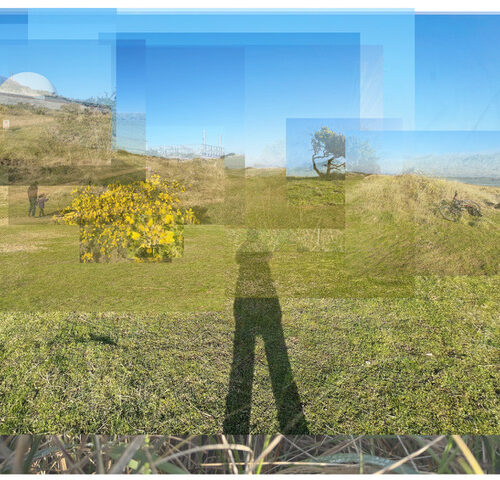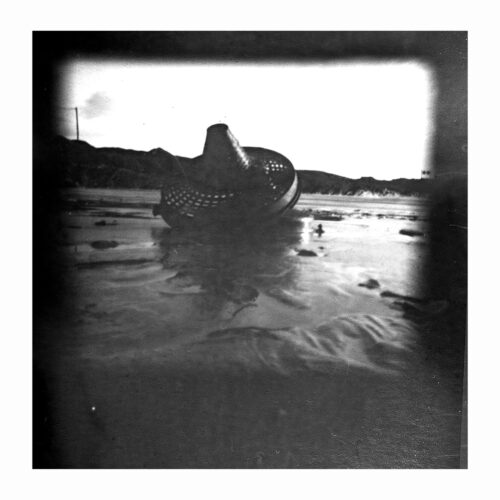
Eeny Meeny Miny Mo…
John Stezaker wins the Deutsche Börse Photography Prize 2012.

John Stezaker
Siren Song V, 2011
Collage, 25.7 x 20.3 cm
Courtesy of the artist and The Approach, London.
John Stezaker (b. 1949) is a British artist who gives old images new meanings by joining together old and forgotten photographs to produce eerie, humorous and often strange collages. Drawing on the tradition of the readymade, famed by Marcel Duchamp, Stezaker takes found imagery and appropriates them, adding his own vision to create the art.
The other shortlisted candidates (who each receive £3,000) were Pieter Hugo for his publication Permanent Error, Rinko Kawauchi (b.1972, Japan) for her publication Illuminance and Christopher Williams (b. 1956, USA) for his exhibition Kapitalistischer Realismus at Dům umění České Budějovice, Budweis, Czech Republic.
The Prize is awarded to a photographer of any nationality for their significant contribution to the medium of photography either through an exhibition or publication, in Europe between 1 October 2010 and 30 September 2011. John Stezaker won for his exhibition at the Whitechapel Gallery, London, UK (29 January – 18 March 2011).
So states the press release from The Photographers’ Gallery giving us a sliver of insight into the judging criteria for winning the £30,000 coveted award.
“significant contribution” seems a bit vague. What are they looking for?
Peter Hugo’s images were a celebration of photography with the prints simply speaking for themselves. Rooted in real life they provide a shocking and yet somehow beautiful confrontation with a political sphere most of us are comfortable not having to face. The prints themselves were presented almost perfectly in white, highlighting the sinister dark material all the more effectively.
Rinko Kawauchi’s approach couldn’t have been more different. The presentation had a ring of Wolfgang Tillmans to it with a seemingly random selection of sizes and subject matter splayed over the two walls. The overall mesmerising impact leaving you feeling dizzy and hypnotised, a stark contrast to the sobering effect of Hugo.
Then Christopher Williams.
Deutsche Börse has a tendency to raise the unanswerable question “what is photography?”, giving the media a field day every time. Last year it was Thomas Demand who got the purists riled by calling himself a conceptual artist instead of a photographer (shock, horror). His work depends on recreations of actual places, installations, which he then photographs. In doing so he challenges one of the most intrinsic aspects of photography – is it a document or is it art? Christopher Williams was the self proclaimed artist this year. In some senses he was the prime candidate, coming out of America under the first generation of conceptual artists such as John Baldessari. Instead of using photography to understand the world he uses the world to understand photography.
Before the results were revealed for this years prize, Sean O’Hagan, in the Guardian, wrote of John Stezaker: [He] “may yet become the first winner of the Deutsche Börse photography prize never to have taken a photograph”. Which is reminiscent of his question last year “When is contemporary photography not photography?”
The zeitgeist issue of what makes a good photograph will never go out of fashion, but a fundamental and perhaps more troubling question is still being asked ‘what is photography anyway?’ I’m not sure how many people are listening.
And why do we place so much importance on the opinions of a few to validate our worth as photographers? What happened to never making it in your lifetime?
It seems to me that any one of these artists could have stolen the show with their “significant contribution” to the medium and your guess was as good as mine. But we weren’t in the room.
As an aside, while we are on the issue of appropriation, I can’t help but feel sorry for poor Richard Prince. In America you get sued for using other people’s pictures and in England you get given a prize.
God bless America.
16 thoughts on “Eeny Meeny Miny Mo…”
Comments are closed.






Thanks for the post Sharon. As I said on the oca-student forums…
It was predictable that Pieter Hugo didn’t stand a chance. JIm Goldberg won the prize last year and that ruled out the possibility of any documentary body of work to win again this year. Which is a shame, because Hugo’s work is more inclusive, more accessible.
I find it problematic to mix radically different photographic practices such as Hugo’s and Stezaker’s in the same photography award, particularly one of such high profile as the Borse. The Borse prize endorses Stezaker’s work and adds huge value and gravitas to it. And when that is done in a context in which you also find Hugo’s work, one can’t help being rather disoriented as to what really has true value, what is worthwhile, what is meaningful and what is not, what reaches out and what is parroquial and self-indulgent.
Jose Are you saying that the judges end up with a choice of genre? If they award documentary every year then that would not be fair! My choice would have been for Hugo because his work speaks to me but I also liked Rinko Kawauchi’s work.
Precisely! It is a lottery. But I do think all shortlisted artists were worthy competitors, albeit for different reasons, just to be clear! So I guess the selectors do know a bit about ‘good art’ whatever their definitions. It’s not just any old photo comp.
Is Stezaker a photographer?
Yes, I appreciate this may sound like a flippant response but actually I consider it a genuine question! Can one consider anyone who decides to assemble photographs a photographer? Perhaps not a question of great import … !!
He’s working with photography and its the Deutsche Borse Photography Prize. I think that’s not much of an issue anymore, personally.
what is not an issue? Stezaker never having taken a photograph presumably!
Sean O’Hagan asks this question in his review …
http://www.guardian.co.uk/artanddesign/2012/sep/03/why-john-stezaker-deserves-win
” … capturing that moment of deep seeing, in a split second. That is now in danger of fast becoming an irredeemably old-fashioned idea …”
Yet surely there is still a need to make photographs even if artists choose not to, preferring to use the work of others!
If I was to question the giving of this prize to Stezaker it would be whether a work of art containing photographs is necessarily “photography” !?
I’m beginning to suspect there are as many definitions of photography as there are photographers and artists (and prize giving committees!)
I’ll second that!
Thanks for this posting Sharon.
I had been thinking about this prize because I found it hard to understand what is about.
I saw Stezaker’s work at The Saatchi Gallery and appreciated it but did not find it appealing; it was Christopher Williams’ work that I found problematic!
I went to the show two weeks ago and I must admit that I was surprised that these 4 were the most significant contributions to photography in Europe over a year. Christopher Williams’ 3 (?!?) random photographs were poor; Rinko Kawauchi’s Illuminance photos were poorly edited with some real gems diluted with some (in my opinion) poor and uninteresting images; John Stezaker’s collages were interesting but not great photography. The best shots for me were Pieter Hugo’s pictures of technological waste being recycled in Ghana; they were superb but not desperately original. There are very similar photos on display in Manchester Art Gallery at the moment by Nyaba Léon Ouedraogo (http://www.wefaceforward.org/artists…léon-ouedraogo) and George Osodi (http://georgeosodi.photoshelter.com/…00ns8MS37FfZU/).
I find it hard to believe that there wasn’t much better work out there to choose from.
Mike
While I rather share your views, as a student, I try to understand what has made critics and the like choose work such as this. It is not easy to understand and yet I have not given it a lot of thought … maybe one should buy the portfolio and read through the introductions to each artist. It is pointless to be dismissive and yet one is bound to have some sort of intuitive response …
I just do not understand any of this.
Here is the brief about the prize …
Each year, the Deutsche Börse Photography Prize is awarded to a contemporary photographic artist who made a significant contribution to photography in Europe through an exhibition or publication in the year before. The award provides comprehensive insight into the current trends of international photography.
I think Stezaker got the prize for being innovative yet for me, Hugo seems truer to the spirit of the photograph.
As the saying goes, “it does matter if you sing out of tune as long as you are German!!”